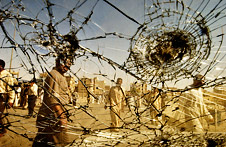
There is an Iraq war for every man, woman, and child in the United States, just as there is certainly an Iraq war for the 26 million Iraqis who struggled, fought and were destroyed by it, but in the American case, the war is material for debate unless you passed through its dark machinery. We look at the war through politics, we see ourselves in the folly of it, or the borderline supernatural military might we expended there, or even in the tens of thousands of dead left behind. It was about more than money, but it was about money. Corporations gorged themselves upon it. For me, the Iraq war refuses to enter the world of politics and instead occupies a Hadean realm that I have always failed to describe in the years I spent traveling there.
Inside Iraq it was always a different story. Al Muntanabbi street full of books of poems and Baghdad's intellectuals drinking coffee rich with cardamom seeds, the great dust storms that rose up and buried the city in red light closing the airports and bringing the helicopters down out of the sky. The Mahdi Army fighters singing before engaging U.S. forces, fighting in a vast cemetery and dying there, Marines hauling reporters out of sniper fire and protecting them with their bodies. It happened more than once that commanders ordered their men not to talk to the press, reporters were escorted off U.S. bases with instructions never to return. There was the biblical feeling of the place, the lamb's blood on the walls when a family mourned their dead. The plain look of fear in a brigadier general's eyes when the subject of an investigation came up. Hooded prisoners. The courtyard of Abu Ghraib before it was taken over by U.S. forces and the rotting bodies lying under sheet metal where dogs had found them. The roadside bombs and mortars at all hours of the day or night. The endless roads of Iraq lined with bullet-pocked wrecks, the burning ruins of Mosul and Fallujah, the gold tomb of Imam Ali in Najaf shining through the smoke of the siege. Then later the infinite weight of fear in the capital in 2005 and 2006, the thousands of disappearing families, the plague of fake roadblocks. Death squads moving through the city in anonymous cars, the massive casualty attacks on Shiite markets by Sunni militants, the rank smell of the bodies taken to the morgue. The team of kidnappers attacking from the car in Sadr City at three in the afternoon, firing their kalashnikovs from the windows, the escape and then the splintering crash into the truck. The Tigris rushing cold and fast down from the Taurus mountains, the stars at the landing zone at midnight when the Chinooks came for us and where the child soldier at flight ops blasted Jimi Hendrix out of his stereo and made the waiting generals listen in silence. I remember it all but it comes back differently every time.
The stories were just an attempt to hold it all down, make it be still long enough to get an image.![]()
 LEAD IMAGE: Najaf, Iraq, August 2004. A man looks through a bullet-riddled car window near the old cemetery, just after the end of the siege.
LEAD IMAGE: Najaf, Iraq, August 2004. A man looks through a bullet-riddled car window near the old cemetery, just after the end of the siege.Photo: Thorne Anderson
© Phillip Robertson, 2009-2020.
